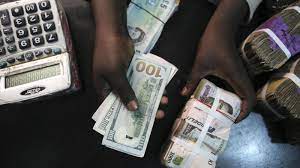Analysis of the latest statistics released by the National Bureau of Statistics (NBS) shows that naira devaluation has triggered a loss of about $193 billion in the country’s gross domestic product (GDP) when converted from naira to dollar. In June 2023, the CBN announced the unification of all segments of the forex market, collapsing all windows into one. This was part of an effort to drive liquidity and stability in the forex market in Nigeria. However, this seems to have had a counter-effect, as it triggered further instability in the market. According to the statistics, Nigeria amassed a total GDP of N224.54 trillion for the year-long period from the first quarter of 2022 to the third quarter of 2023. Converted to U.S. dollars at the exchange rate on the website of the Central Bank of Nigeria (CBN) at the end of September 2023 (N768.76/$1, Nigeria’s GDP stands at approximately $292.08 billion. However, using the exchange rate before the foreign exchange unification policy of about $462.88/$, Nigeria’s GDP would have been at approximately $485.09 billion. The naira devaluation of 39.79 per cent also triggered a loss of value in the GDP in dollar terms at the same rate. It hit a high of N62.05 trillion in the third quarter of 2023, which is higher than the value in the second quarter o f2023 (N52.76 trillion) and in the first quarter of 2023 (N51.95 trillion), and even the third quarter of 2023-N53.18 trillion. According to founder and chief consultant of B. Adedipe Associates Limited (BAA Consult), Dr. Biodun Adedipe, Nigeria’s USD GDP will continue to shrink under the unified exchange rates regime, arguing that largely import-dependent economic activities and lifestyle with a low domestic production base are a recipe for unabated depreciation. Also speaking, the chief executive officer, Centre for the Promotion of Private Enterprise (CPPE), Dr Muda Yusuf, said there is no silver bullet in the treatment of the current fate of the naira.
